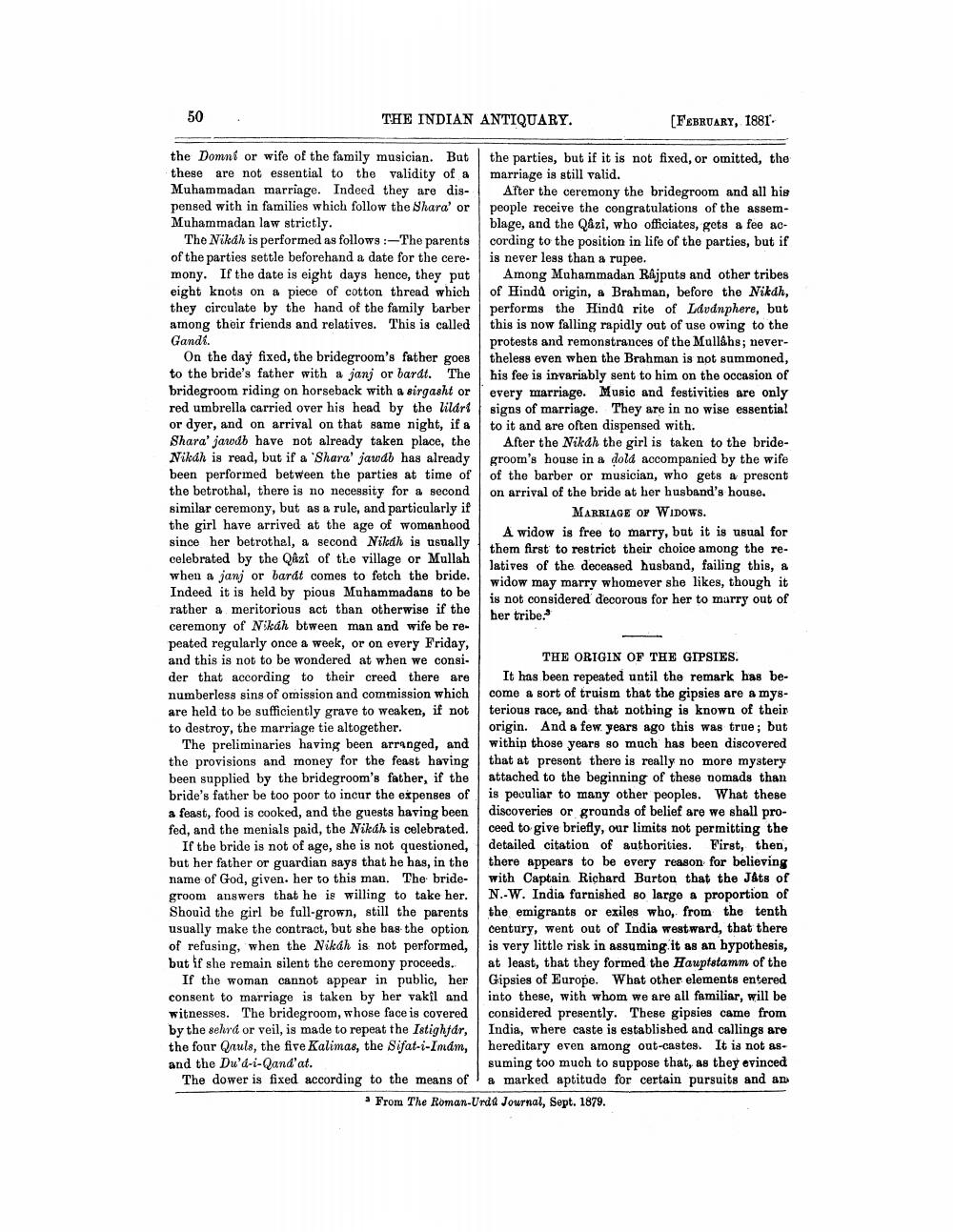________________
50
THE INDIAN ANTIQUARY.
(FEBRUARY, 1881
the Domni or wife of the family musician. But the parties, but if it is not fixed, or omitted, the these are not essential to the validity of a marriage is still valid. Muhammadan marriage. Indeed they are dis- After the ceremony the bridegroom and all his pensed with in families which follow the Shara' or people receive the congratulations of the assemMuhammadan law strictly.
blage, and the Qazi, who officiates, gets a fee acThe Nikdh is performed as follows:-The parents cording to the position in life of the parties, but if of the parties settle beforehand a date for the cere- is never less than a rupee. mony. If the date is eight days hence, they put Among Muhammadan Rajputs and other tribes eight knots on a piece of cotton thread which of Hindu origin, a Brahman, before the Nikdh, they circulate by the hand of the family barber performs the HindQ rite of Ldvanphere, but among their friends and relatives. This is called this is now falling rapidly out of use owing to the Gandi.
protests and remonstrances of the Mullâhs; neverOn the day fixed, the bridegroom's father goes theless even when the Brahman is not summoned, to the bride's father with a janj or bardt. The his fee is invariably sent to him on the occasion of bridegroom riding on horseback with a sirgasht or every marriage. Music and festivities are only red umbrella carried over his head by the lilar signs of marriage. They are in no wise essential or dyer, and on arrival on that same night, if a to it and are often dispensed with. Shara' jawab have not already taken place, the After the Nikah the girl is taken to the brideNikdh is read, but if a Shara' jawdb has already groom's house in a dold accompanied by the wife been performed between the parties at time of of the barber or musician, who gets a present the betrothal, there is no necessity for a second on arrival of the bride at her husband's house. similar ceremony, but as a rule, and particularly if
MARRIAGE OP WIDOWS. the girl have arrived at the age of womanhood
A widow is free to marry, but it is usual for since her betrothel, a second Nikdh is usually
them first to restrict their choice among the recelebrated by the Qazi of the village or Mullah
latives of the deceased husband, failing this, a when a janj or barát comes to fetch the bride.
widow may marry whomever she likes, though it Indeed it is held by pious Muhammadans to be
is not considered decorous for her to marry out of rather a meritorious act than otherwise if the
her tribe." ceremony of Nikah btween man and wife be repeated regularly once a week, or on every Friday, and this is not to be wondered at when we consi.
THE ORIGIN OF THE GIPSIES. der that according to their creed there are It has been repeated until the remark has benumberless sins of omission and commission which come a sort of truism that the gipsies are a mysare held to be sufficiently grave to weaken, if not terious race, and that nothing is known of their to destroy, the marriage tie altogether.
origin. And a few years ago this was true; but The preliminaries having been arranged, and within those years so much has been discovered the provisions and money for the feast having that at present there is really no more mystery been supplied by the bridegroom's father, if the attached to the beginning of these nomads than bride's father be too poor to incur the expenses of is peculiar to many other peoples. What these a feast, food is cooked, and the guests having been discoveries or grounds of belief are we shall profed, and the menials paid, the Nikah is celebrated. ceed to give briefly, our limits not permitting the
If tbe bride is not of age, she is not questioned, detailed citation of authorities. First, then, but her father or guardian says that he has, in the there appears to be every reason for believing name of God, given. her to this man. The bride- with Captain Richard Burton that the Jåts of groom answers that he is willing to take her. N.-W. India furnished so large a proportion of Shouid the girl be full-grown, still the parents the emigrants or exiles who, from the tenth usually make the contract, but she has the option century, went out of India westward, that there of refusing, when the Nikáh is not performed, is very little risk in assuming it as an hypothesis, but If she remain silent the ceremony proceeds. at least, that they formed the Hauptstamm of the
If the woman cannot appear in public, her Gipsies of Europe. What other elements entered consent to marriage is taken by her vakil and into these, with whom we are all familiar, will be witnesses. The bridegroom, whose face is covered considered presently. These gipsies came from by the sehrá or veil, is made to repeat the Istighfar, India, where caste is established and callings are the four Qruls, the five Kalimas, the Sifat-i-Imdm, hereditary even among out-castes. It is not asand the Du'd-i-Qand'at.
suming too much to suppose that, as they evinced The dower is fixed according to the means of a marked aptitude for certain pursuits and an
- From The Roman-Urdd Journal, Sept. 1879.




